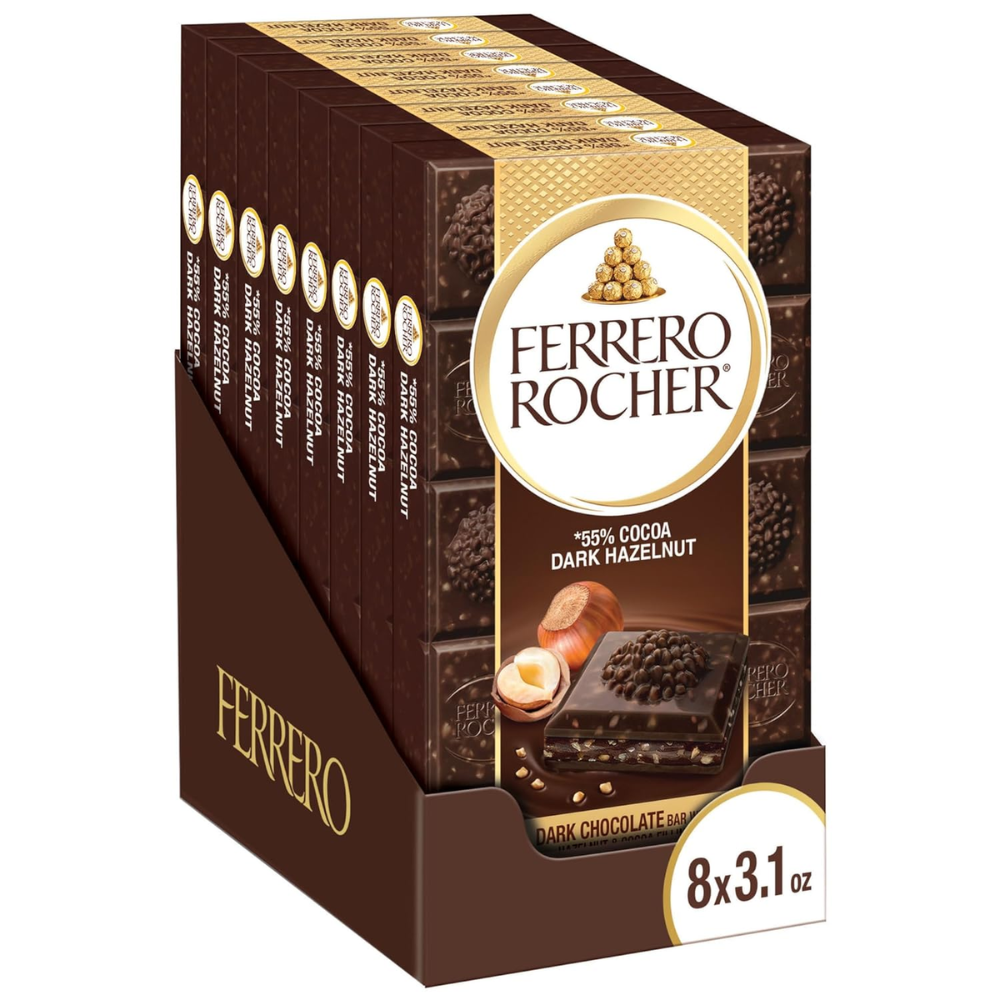Discovering the Depths of Dark Chocolate

Dark chocolate is not merely a sweet indulgence; it is an experience that combines rich history, intricate processes, and a plethora of health benefits. Whether you're a health enthusiast, a chocolate lover, or a foodie at heart, a dark chocolate bar offers something for everyone.
In this detailed exploration, we'll take a look at the origins of dark chocolate, uncover the secrets of its production, and address some of the most common questions surrounding this delectable treat.

The Origins of Dark Chocolate
From Cacao to Chocolate
Dark chocolate's story begins with the cacao tree, Theobroma cacao, a plant native to the lush tropical regions of Central and South America. The word "Theobroma" actually means "food of the gods," reflecting the revered status cacao held among ancient civilizations like the Maya and Aztecs. These cultures consumed cacao in the form of a bitter beverage, often reserved for nobles and warriors.
Ancient Civilizations and Their Connection to Cacao
The Maya are credited with cultivating cacao trees as early as 900 AD. They would roast cacao beans and grind them into a paste mixed with water, chili peppers, and cornmeal—a far cry from the sweet chocolate bars we're familiar with today. The Aztecs also valued cacao highly, using the beans as a form of currency and as offerings to their deities.
The Journey to Europe
With the arrival of European explorers in the Americas, cacao beans made their way across the Atlantic. By the 16th century, the Spanish had introduced chocolate to Europe, where it quickly gained popularity among the elite. Over time, sugar and milk were added to create what we now know as milk chocolate, but dark chocolate remained a beloved choice for many.

How Dark Chocolate is Made
Harvesting and Fermentation
The process of making dark chocolate begins with harvesting cacao pods, which contain the precious cacao beans. Once harvested, the beans are extracted from the pods and undergo a fermentation process lasting several days. This crucial step develops the beans' flavor profiles, releasing the rich, complex notes that dark chocolate lovers cherish.
Drying and Roasting
After fermentation, the cacao beans are dried in the sun before being roasted. Roasting plays a vital role in enhancing the flavor of the beans and gives the chocolate its characteristic aroma. The temperature and duration of roasting can vary, influencing the final taste of the chocolate bars.
Grinding and Conching
Once roasted, the beans are ground into a paste called chocolate liquor, which contains both cocoa solids and cocoa butter. The chocolate liquor is then conched—a process that involves continuous mixing to refine the texture and flavor. During conching, additional ingredients such as sugar and vanilla may be added. Dark chocolate typically contains less sugar than milk chocolate, allowing the natural bitterness and depth of the cocoa to shine through.
Tempering and Molding
The final steps in dark chocolate production involve tempering and molding. Tempering ensures that the cocoa butter crystals are stable, giving the chocolate a smooth, glossy finish and a satisfying snap when broken. The tempered chocolate is then poured into molds and cooled to create solid chocolate bars.

The Health Benefits of Dark Chocolate
Rich in Antioxidants
Dark chocolate is renowned for its high levels of antioxidants, particularly flavonoids, which are known for their ability to combat oxidative stress in the body. Antioxidants help neutralize free radicals, reducing the risk of chronic diseases and promoting overall well-being.
Heart Health
Several studies have suggested that moderate consumption of dark chocolate can support cardiovascular health. The flavonoids in dark chocolate may improve blood flow, reduce inflammation, and lower blood pressure—factors that contribute to a healthier heart.
Boosting Brain Function
The benefits of dark chocolate extend to cognitive health as well. Compounds in dark chocolate have been shown to enhance brain function by increasing blood flow to the brain, improving memory, and supporting mental clarity.
Mood Enhancement
For those seeking a mood boost, dark chocolate may offer some relief. It contains compounds that can trigger the release of endorphins, the body's natural feel-good chemicals. Additionally, the presence of serotonin precursors in dark chocolate can have a calming effect on the mind.
Nutritional Value
Beyond its delightful taste, dark chocolate is a good source of essential nutrients. It contains iron, magnesium, copper, and manganese, along with healthy fats from cocoa butter. Unlike milk chocolate, which contains more sugar and dairy, dark chocolate provides a richer, more nutrient-dense option for those mindful of their diet.

Dark Chocolate vs. Milk Chocolate
Less Sugar, More Cocoa
One of the key distinctions between dark chocolate and milk chocolate is the sugar content. Dark chocolate typically contains far less sugar, allowing the intense cocoa flavors to dominate. This makes it a preferred choice for those who appreciate the bold taste of gourmet dark chocolate bars.
The Role of Cocoa Butter
Dark chocolate also contains a higher percentage of cocoa solids and cocoa butter, contributing to its smooth texture and intense flavor profile. Cocoa butter, a naturally occurring fat in cacao beans, provides the rich mouthfeel that dark chocolate lovers adore.
The Absence of Dairy
Unlike milk chocolate, which includes milk solids or condensed milk, dark chocolate is often dairy-free. This makes it an ideal choice for individuals with lactose intolerance or those following a plant-based diet.

Exploring Gourmet Dark Chocolate Bars
Artisanal Creations
For those seeking an elevated chocolate experience, gourmet dark chocolate bars offer a wide range of flavors and textures. Artisanal chocolatiers experiment with unique ingredients like sea salt, tree nuts, and spices to create complex flavor profiles that tantalize the taste buds.
Single-Origin Dark Chocolate
Single-origin dark chocolate bars highlight the distinct flavors of cacao from specific regions, allowing chocolate enthusiasts to explore the nuances of each origin. From the fruity notes of Peruvian cacao to the earthy tones of Ecuadorian beans, single-origin chocolates provide a sensory adventure.

Top Pick According To Kiki

#1 Best Dark Chocolate
Ferrero Rocher Dark Chocolate Hazelnut Chocolate Bar (3.1 ounces) (Pack of 8)
Common Questions About Dark Chocolate
Are you tired of constantly searching for answers to your questions about dark chocolate?
We know how frustrating it can be to spend hours scrolling through endless forums and reviews, only to find conflicting information and still not feel confident in your decision.
Say goodbye to the endless search and hello to convenience with Kiki. Our comprehensive FAQ section has all the answers you need in one convenient place. No more wasted time or confusion. It's a game-changer.
Is Dark Chocolate Really Healthier Than Milk Chocolate?
Firstly, it's important to understand that both dark chocolate and milk chocolate are made from cacao beans. However, the main difference lies in the processing methods and additional ingredients used. Dark chocolate is made by combining cocoa solids, cocoa butter, and sugar. On the other hand, milk chocolate also contains milk powder or condensed milk along with these ingredients.
Now let's talk about the nutritional value of these chocolates. Dark chocolate typically has a higher percentage of cocoa solids (usually 70% or more) compared to milk chocolate which usually hovers around 30%. This means that dark chocolate contains more antioxidants and flavonoids - compounds that have been linked to various health benefits including improved blood flow and reduced risk of heart disease.
Moreover, dark chocolate also tends to have lower amounts of added sugar compared to its milky counterpart. Excessive consumption of added sugars has been linked to several health issues like obesity and tooth decay. In fact, some studies have suggested that consuming high amounts of added sugars can increase one's risk for chronic diseases like diabetes.
Apart from its impressive antioxidant content, dark chocolate also contains important nutrients such as iron, copper, magnesium, and manganese - all essential for maintaining good overall health.
But what about milk? Doesn't it provide valuable nutrients such as calcium? Well yes, it does, but not enough to offset its negative aspects. Today, milk is heavily processed before being included in most chocolates, and this reduces its nutrient value. Dairy products have also been linked to various negative effects on human health, such as increased inflammation, hormonal imbalances, and digestive issues. Not exactly what you would want from your "healthy" chocolate bar, right?
Furthermore, dark chocolate has a lower glycemic index compared to milk chocolate, meaning it doesn't cause drastic spikes in blood sugar levels. This makes it a healthier option for people with diabetes or those trying to manage their blood sugar levels.
But before you rush off to the store and stock up on dark chocolate, there are a few things to consider. Eating any type of chocolate in excess can lead to weight gain and other health issues due to its high calorie and fat content. And it goes without saying that moderation is key when it comes to indulging in any type of treat.
How Much Dark Chocolate Should I Consume?
According to most nutrition experts, the recommended daily intake of dark chocolate for an average adult is around 1 ounce or 28 grams per day. This amount equates to approximately one small square of a standard-sized bar of dark chocolate.
One important factor in determining the appropriate amount of dark chocolate to consume is its cocoa percentage. In general, the higher the cocoa content, the more health benefits can be derived from consuming dark chocolate. However, this also means that it contains more saturated fat and calories per serving.
In addition to paying attention to cocoa percentage, individuals should also take into account their overall diet and lifestyle when deciding on their personal limit for daily dark chocolate consumption. For example, if someone follows a low-calorie or low-sugar diet, they may choose to consume less than 1 ounce per day in order not to exceed their recommended calorie or sugar intake.
But even though moderate amounts of dark chocolate can provide some health benefits such as improving cardiovascular health and reducing inflammation due to its high antioxidant content, it's important not to overindulge. Consuming large amounts of any type of food can lead to not only weight gain but potentially other negative side effects such as digestive issues or headaches.
Furthermore, it's crucial for individuals who have certain medical conditions or are taking certain medications (such as blood thinners) to consult their doctor before incorporating large quantities of dark chocolate into their diet.
Can Dark Chocolate Be Part Of A Weight Loss Plan?
First and foremost, dark chocolate is packed with antioxidants. These powerful compounds are known for their ability to fight off harmful free radicals in the body. Free radicals can lead to inflammation and cell damage, both of which can hinder weight loss efforts. By consuming dark chocolate regularly, individuals can boost their antioxidant intake and protect their cells from damage.
Furthermore, dark chocolate contains high levels of flavonoids - a type of plant compound with numerous health benefits. One study found that flavonoids in dark chocolate can help regulate insulin levels and improve metabolism, leading to potential weight loss effects. Additionally, these compounds have been linked to reducing cravings for sweet or fatty foods - an essential aspect for staying on track with a weight loss plan.
Another factor that makes dark chocolate suitable for weight management is its low glycemic index (GI). GI measures how quickly certain foods raise blood sugar levels after consumption. Foods with lower GI values are digested slower and keep individuals feeling fuller longer - ultimately decreasing snacking between meals and aiding in calorie control.
But perhaps the most significant benefit of incorporating dark chocolate into a weight loss plan is its effect on mood-boosting hormones such as endorphins and serotonin. Many people often turn to food when stressed or emotional; however, the consumption of small amounts (1-2 squares) of dark chocolates has been proven to increase feelings of pleasure without any adverse effects on overall caloric intake.
Of course, it's worth noting that moderation is key when including dark chocolates in your diet plan - too much could result in additional calories consumed rather than burned off through exercise or daily activities! As with any food, balance is essential. For optimal results, it's recommended to consume about 1 ounce (28 grams) of dark chocolate per day.
What Percentage Of Cocoa Should I Look For In Dark Chocolate?
When it comes to dark chocolate, the percentage of cocoa is a crucial factor to consider. While some chocolate lovers may prefer a stronger cocoa taste, others may enjoy a milder flavor. Therefore, it is essential to understand what percentage of cocoa you should look for in dark chocolate.
First and foremost, one must understand that the higher the percentage of cocoa, the more intense and bitter the flavor will be. This is because dark chocolate contains a higher amount of cacao solids compared to other types of chocolates such as milk or white chocolate. These cacao solids give dark chocolate its strong and distinct flavor.
Typically, dark chocolate with 70-85% cocoa content is considered ideal for most people as it strikes a balance between bitterness and sweetness. However, some individuals may find this too bitter for their liking. In that case, they can opt for dark chocolate with lower percentages of cocoa such as 60% or even 50%.
On the other hand, if you are a true connoisseur of rich flavors and have an acquired taste for bitterness in your sweets, then you might want to try out varieties with much higher proportions of cocoa - upwards from 90%. These chocolates will have an intense earthy flavor with underlying notes of nuttiness or fruitiness depending on their origin.
Apart from satisfying your taste buds, opting for darker varieties also has several health benefits. Cocoa has high levels of antioxidants which help improve heart health by lowering blood pressure and reducing inflammation in arteries. It also contains flavonols which aid in improving brain function by increasing blood flow to critical areas.
When looking at percentages on labels while purchasing dark chocolates, one must keep two things in mind: first being that these numbers refer only to cacao solids present in the product; secondly being that they do not include any added ingredients like sugar or dairy products used during processing.
Is Organic Dark Chocolate Worth It?
Firstly, let's define what organic dark chocolate actually means. It refers to a type of chocolate that is made from cocoa beans that have been grown without the use of pesticides, synthetic fertilizers, or any other artificial chemicals. This means that it is free from any harmful substances that can potentially be present in non-organic chocolates.
One of the main reasons why people choose organic dark chocolate over regular ones is because of its antioxidant activity content. Antioxidants are compounds known for their ability to fight off free radicals in our bodies which can cause various diseases and aging effects. Organic dark chocolate contains high levels of these antioxidants due to its pure and natural ingredients.
Moreover, organic dark chocolate also has a higher percentage of cocoa compared to regular chocolates. Cocoa is rich in flavonoids which have been linked to several health benefits such as improving heart health, reducing inflammation, and even boosting brain function. So by consuming organic dark chocolate, you're not only indulging your sweet tooth but also providing your body with vital nutrients.
Additionally, since organic farming practices do not involve using chemicals or genetically modified organisms (GMOs), it helps protect our environment by preventing soil erosion and preserving biodiversity. By choosing organic products like dark chocolate, we are contributing towards sustainable agriculture and promoting a healthier ecosystem for future generations.
Some may argue that organic products come at a higher price point compared to conventional options. However, when we take into consideration the long-term benefits on both our health and environment offered by choosing organic over non-organic products, it proves to be a worthy investment.
Key Points Summary
- Dark chocolate has a rich history dating back to ancient civilizations like the Maya and Aztecs.
- The process of making dark chocolate involves fermentation, roasting, grinding, conching, tempering, and molding.
- Health benefits include antioxidant properties, heart health support, brain function enhancement, and mood elevation.
- Dark chocolate contains more cocoa and less sugar than milk chocolate, making it a healthier indulgence.
- Gourmet dark chocolate bars offer a wide variety of flavors and textures, including single-origin options.
- Moderation is important when consuming dark chocolate, and a cocoa content of 70% or higher is recommended for maximum benefits.
Best Dark Chocolate For You
Dark chocolate is a multifaceted delight that tantalizes the senses, captivates the imagination, and offers a range of health benefits. From its ancient origins to its modern-day appeal, dark chocolate continues to be a beloved treat for health enthusiasts, chocolate lovers, and foodies alike.
Whether you savor gourmet dark chocolate bars or enjoy a simple piece of chocolate after a meal, this delectable indulgence is sure to bring joy to your day.
For those curious to explore the world of dark chocolate further, consider sampling different varieties and seeking out artisanal creations. With its rich history and myriad flavors, dark chocolate is a treat worth savoring, one bite at a time.
Chocolatefully,
Kiki And His Team





